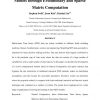Free Online Productivity Tools
i2Speak
i2Symbol
i2OCR
iTex2Img
iWeb2Print
iWeb2Shot
i2Type
iPdf2Split
iPdf2Merge
i2Bopomofo
i2Arabic
i2Style
i2Image
i2PDF
iLatex2Rtf
Sci2ools
123
click to vote
NC
2006
2006
Learning short multivariate time series models through evolutionary and sparse matrix computation
Multivariate Time Series (MTS) data are widely available in different fields including medicine, finance, bioinformatics, science and engineering. Modelling MTS data accurately is important for many decision making activities. One area that has been largely overlooked so far is the particular type of time series where the data set consists of a large number of variables but with a small number of observations. In this paper we describe the development of a novel computational method based on Natural Computation and sparse matrices that bypasses the size restrictions of traditional statistical MTS methods, makes no distribution assumptions, and also locates the associated parameters. Extensive results are presented, where the proposed method is compared with both traditional statistical and heuristic search techniques and evaluated on a number of criteria. The results have implications for a wide range of applications involving the learning of short MTS models.
| Added | 14 Dec 2010 |
| Updated | 14 Dec 2010 |
| Type | Journal |
| Year | 2006 |
| Where | NC |
| Authors | Stephen Swift, Joost N. Kok, Xiaohui Liu |
Comments (0)

